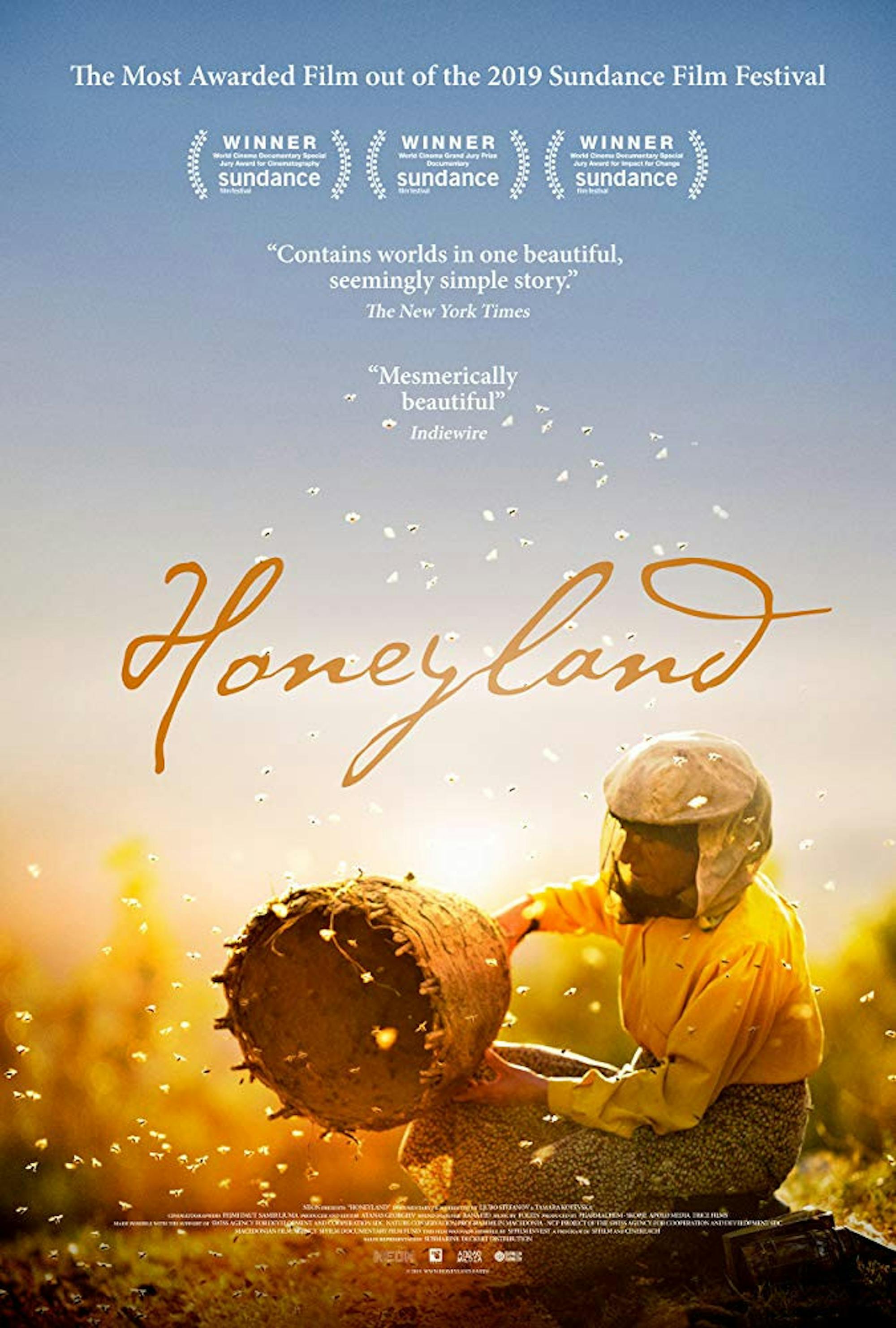The most revealing moment of “Honeyland” (2019), a Macedonian beekeeping documentary that some are heralding as 2019’s best film, arrives early on, during the first and only time when the film and its stoic heroine venture far outside their element. Hatidze Muratova, an ethnically Turkish woman living in a remote, mountainous corner of the Republic of North Macedonia, treks from the sumptuously-rendered scraggly hills she has called home all her life to sell her renowned honey in the bustling market halls of Skopje, the capital city of North Macedonia.
Recognizing that a market vendor is a fellow Turk, she strikes up a conversation with him. Since she was born in 1964, Hatidze tells him she has seengenerations of Albanian and Turkish familiesmigrate away from her village, leaving just her and her mother to eke out a living in a stone house devoid of electricity or running water. She continues to work the land, inching along steep cliffs and crossing rivers on precarious branches to gently coax the bees into relinquishing half of their honey to her.
Against the seismic reverberations of political and demographic change that have marked the Balkans’ postmodern age, Hatidze continues to uphold the same sacred contract with the bees that her predecessors have honored since time immemorial. That rich, legendary mood of timelessness has led some critics to label filmmakers Tamara Kotevska and Ljubomir Stefanov as the makers of a modern-day parable. When Hussein and Ljutvie Sam arrive with their children to raise cows in the abandoned property next door, their struggle to survive in the harsh environment soon jeopardizes Hatidze’s undisturbed way of life.
The searingly intimate “Honeyland”opts for adocudrama structure, eschewing talking heads and expository text. The production team spent three years following Hatidze, yielding over 400 hours of footage. The end result, a tight 87 minutes, gives us a family feud no less quietly mythic and simmering than that of “The Godfather” (1972), albeit one viewed through an ecologically-minded lens more reminiscent of “Food, Inc.” (2008).
Cinematographer Fejmi Daut deserves much of the credit for the organic sense of familiarity we come to develop with the characters. He opts to introduce us to Hatidze in a succession of gorgeously monumental wide shots as she trudges across the landscape for her honey. When she opens the hives, the camera takes care to adopt Hatidze’s nurturing posture. Duat retains this respect when we venture inside the humble dwelling of Hatidze and her mother. Where a lesser film would opt for strident, unforgiving close-ups, the presence of “Honeyland” feels more like that of a neighbor, witnessing the trials of Hatidze and her eventual adversaries from a position of non-judgment.
Crucially, the warmth that sets “Honeyland” apart from many of its peers does not cause it to flinch away from the realities it depicts. We frustratedly linger with Hatidze as she must loudly repeat everything she says to her mother. We feel viscerally the everyday mild perils of rural, impoverished childhood with the Sam children as they fall onto sharp tree stumps and are kicked by fickle dairy cows. We remain rooted in one spot when one of the older boys storms off following a confrontation with Hussein, hearing only a litany of curses.
Most critics have focused on the pastoral grandiosity of “Honeyland” and how it wordlessly waxes poetry about communion with nature and environmental stewardship. Indeed, it works beautifully as a Lorax-like fable. However, equal discussion should be granted to its masterful depiction of how Hatidze, with characteristic indomitability, wrestles with her own small place in the titanic battle between change and sameness.
The turbulent history of social and political forces far beyond any individual’s control has been channeled through Hatidze's eyes, all while she has been paradoxically rooted in an unchanging time and space. The true mark of this film’s greatness is its empathy and its acknowledgment of the immense weight of history that Hatidze carries on her shoulders. This burden, as seen from Hatidze’s unique and oftentimes profoundly lonely Macedonian hillside, is a universal one, and it places “Honeyland” among the ranks of the decade's most profoundly human stories.
'Honeyland' finds unadulterated beauty in Macedonia's remote hills

The poster for "Honeyland," a North Macedonian documentary released in July, is pictured.
Summary
'Honeyland' is a masterful work of cinema as profoundly empathetic as it is unlikely.
4.5 Stars





